Source : NEW INDIAN EXPRESS NEWS
In 2018, the Vatican agreed a historic but also controversial deal with the communist government in Beijing over the appointment of bishops in China.
But the pope’s calls for peace in Ukraine failed to have any visible impact. In fact, Francis sparked outrage from Kyiv last year after praising those in the war-torn country who had the “courage to raise the white flag and negotiate”.
His calls for an end to fighting in the Middle East also fell flat, and he drew criticism from Israel in December after condemning strikes on Gaza as “cruelty”.
– Compassion, social justice –
A liberal who loved being among his flock, the Jesuit sought to forge a more open Catholic Church, particularly toward divorced, married and LGBTQ members.
The approach angered traditionalists, in particular his 2023 decision to authorise blessings of same-sex couples in some cases. The Vatican was forced to clarify its position after an outcry in Africa and the United States.
One German cardinal, Gerhard Mueller, denounced Francis’s “doctrinal confusion” in a 2023 book.
The son of Italian immigrants to Argentina, Francis strongly defended the rights of migrants, including criticising US President Donald Trump’s plans for mass deportations.
Francis was also a vocal campaigner for the environment. In his groundbreaking 2015 encyclical “Laudato Si” (Praise be to You), he urged the world to act quickly to tackle climate change, saying rich countries bore the most responsibility.
– Reform –
From decentralising power and increasing transparency to providing greater roles for lay people and women, Francis implemented fundamental reforms of the Roman Curia, the central government of the Holy See.
The reforms were consolidated in a 2022 constitution that reorganised the Vatican’s dicasteries, or ministries.
Francis particularly took aim at the murky, scandal-tainted finances of the Vatican, creating a special secretariat for the economy in 2014, clamping down on corruption and stepping up scrutiny of investments and the Vatican Bank, which led to the closure of 5,000 accounts.
He also revolutionised the Synod, a Catholic discussion body, by involving lay members including women. Since 2021 it has looked at the future of the Church, but key decisions, such as allowing women to become deacons, were not due until later this year.
In his institutional reforms, again, Francis faced strong opposition, with some critics accusing him of “tyrannical” behaviour.
SOURCE :- NEW INDIAN EXPRESS






